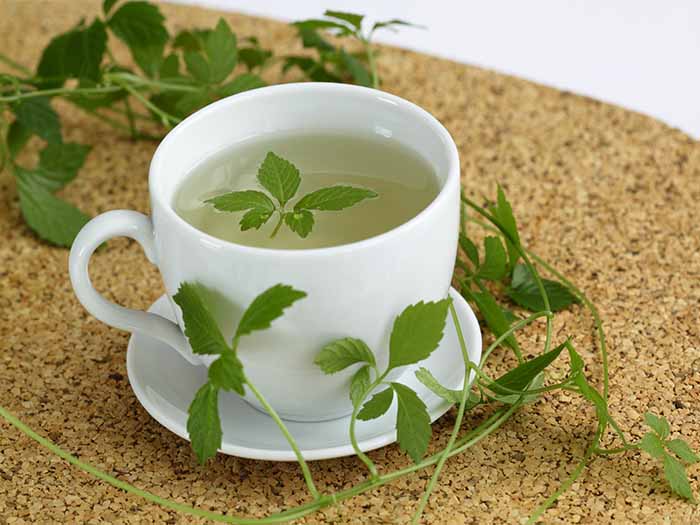Drinking gynostemma tea is a great way to improve your overall health, but there are a few details concerning this tea that is important to understanding.
What is Gynostemma Tea?
Gynostemma tea is an herbal tea brewed from the dried leaves of the Gynostemma pentaphyllum plant, which is commonly known as jiaogulan or ‘poor man’s ginseng’. Native to parts of China, Japan, and Southeast Asia, this plant’s benefits can also be enjoyed through its extract, or in a capsule form. The plant is actually a climbing vine and can now be found naturalized in many other Asian countries. This tea can be found at exotic import stores and health shops around the world, including in the United States. [1]
This tea is so widely sought after because of its unique nutrient composition, which includes certain adaptogens and antioxidants that can increase the levels of energy and endurance in the body. The leaves are also rich in minerals, such as magnesium, calcium, zinc, iron, and manganese.

Herbal teas have many benefits for your health. Photo Credit: Shutterstock
Benefits
The many benefits of gynostemma tea include its effects on endurance, strength, cholesterol, inflammation, fatigue, and diabetes, among others.
Adaptogenic Benefitsd
Gynostemma is an adaptogen, a substance which brings your entire body back into balance. One of the active ingredients in this tea are saponins, called gypenosides, that can help the body adapt and learn how to protect itself more effectively. [2]
Cholesterol Issues
The blood-thinning properties of this tea can help prevent blockage from cholesterol, thus lowering the risk of stroke and heart attack. [3]
Weight Loss
The stimulant nature of this tea makes it ideal for boosting the metabolism and aiding in weight loss efforts. [4]
Longevity
In traditional use, gynostemma tea is believed to extend life, which may be due to the antioxidants and adaptogens found in the green, leafy herb. It’s often called the ‘immortality drink’. [5]
Diabetes
As per a study published in the journal Hormone and Metabolic Research, this tea can help control blood sugar and insulin levels in the body. [6]
How to Make?
Brewing gynostemma tea at home isn’t overly difficult and can make a delicious beverage that can be enjoyed at any time of day. Let us take a look at the recipe below.

An Energizing Gynostemma Tea Recipe
Ingredients
- 8 ounce of filtered water
- 2 tsp of dried gynostemma leaves
- 1 tsp honey
Instructions
- To make Jiaogulan/gynostemma tea, bring a pot of water to boil, then remove it from the heat for 2-3 minutes.
- Add 2 teaspoons of the dried gynostemma leaves to a teapot.
- Pour the hot water over the tea leaves and allow to steep for at least 10 minutes.
- The longer the leaves steep, the more nutrients will be pulled into the tea. You can add a teaspoon of honey to enhance the taste before serving it hot!
Side Effects
Despite the many wonderful benefits of this tea variety made from the jiaogulan vine, there are some potential side effects, such as an upset stomach, problems with the immune system, and complications with pregnancy and breastfeeding.
- Pregnancy: One of the chemicals found in this plant has been linked to birth defects in a very limited number of cases, so it is best to avoid this tea while pregnant.
- Gastrointestinal Issues: Drinking an excessive amount of this tea is known to cause stomach problems, such as diarrhea, nausea, and bloating, among others.
- Immune System: Since this tea is known to stimulate the immune system, it could be dangerous for people with autoimmune diseases, as it could exacerbate the symptoms.
